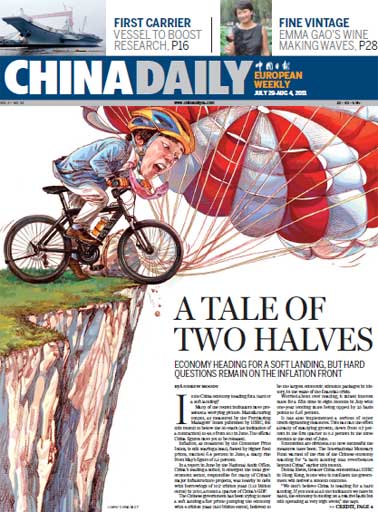View
Go ahead, have it their way
Updated: 2011-07-31 08:23
By Anita Patil (The New York Times)

In our narcissistic bubble, everyone's a critic and everyone's a star. We think we can do it all, and we believe we're always right. But what if the masses are wrong? What if the fewer the voices involved, the better?
Leave it to the experts, and perhaps they are not us. Several restaurants and cafes are saying no to the demanding customer: no to takeout espressos, no to diet soda, no to having your bagel toasted.
"People just assume that every restaurant should be for everyone," David Chang, whose Momofuku restaurants in New York refuse to make substitutions or vegetarian options, told The Times. "Instead of trying to make a menu that's for everyone, let's make a menu that works best for what we want to do."
In New York, Zucco: Le French Diner bans ketchup and Budweiser. At the Spotted Pig, the burger comes with or without Roquefort, no other cheese. And in Chicago, Graham Elliot does not serve decaffeinated coffee at his sandwich shop and coffee bar.
These purist chefs are having it their way, not their customers'.
And perhaps those customers should have some manners.
When the Royal Ballet decided to bring the ballet to the masses, the masses brought beer and nachos. At its performance of "Romeo and Juliet" at the O2 arena in East London in June, the stands were filled with 10,000 people from all walks of life, casually dressed, munching, gulping and milling around, The Times reported. Meant to be a way for the ballet to break free from its rarefied, elitist image, some in the audience missed the airs and graces. Anja Tita, 40, said many didn't take their seats when the dancing began and even rushed for the exits before the last scene finished.
"I don't like to see people eating popcorn during the ballet," she told The Times.
Even if it may no longer be so at the ballet, an air of exclusivity pervades the tech world. Many companies put up a digital velvet rope to keep the masses at bay, inviting a select few to test their new service and offer feedback on bugs or flaws. Entrepreneurs hope to win over early adopters, create buzz and then attract mainstream users, said The Times. Google+ limited access to its social networking service in July while it worked out the kinks. When Spotify, a European music service, came to the United States in mid-July, a free version was by invitation only.

Negative word can spread quickly online, bursting a start-up's bubble even before it has a chance to get off the ground, Susan Etlinger, a technology consultant at the Altimeter Group, told The Times. The danger lies in "setting a high expectation that can bite them later," she said.
And that's precisely what can happen at some do-it-yourself fashion Web sites. In an age of style blogs and reality design shows, everyone's a would-be couturier, and all it takes is the Web and a credit card to order a custom outfit. But maybe we should leave it to the real designers. When a Times reporter tried out three sites, PickYourPerfectPairBras.com, MakeYourOwnJeans.com and MilkandHoneyShoes.com, her creations were less than critic-worthy. Skin-tight jeans made of thin denim, snug shoes made of leather that wasn't supple and a garish hot pink and polka dot bra that didn't fit left her recommending to stick to local retailers where quality, convenience and experienced salespeople are plentiful.
As Mr. Chang told The Times, "The customer is not always right."
E-paper

Double vision
Prosperous Hangzhou banks on creative energies to bridge traditional and modern sectors
Minding matters
A touch of glass
No longer going by the book
Specials

Carrier set for maiden voyage
China is refitting an obsolete aircraft carrier bought from Ukraine for research and training purposes.

Pulling heart strings
The 5,000-year-old guqin holds a special place for both european and Chinese music lovers

Fit to a tea
Sixth-generation member of tea family brews up new ideas to modernize a time-honored business
